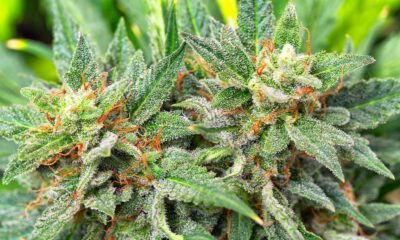
Joint Opinions
Push for the Best Legalization
Marijuana legalization oftentimes gets caught up in the conversation about marijuana regulation instead.
On Tuesday, Andrew Cuomo, the governor of New York, said his state should legalize cannabis. In his State of the State address, Cuomo promised his state would legalize cannabis for adults 21 and over.
Cuomo tried this last year and it didn’t work out, but not because marijuana legalization is a bad idea. Broadly speaking, it’s a good idea, and you should support it. According to most every poll, you probably do.
If you don’t, you are either a cop, or a creep. Maybe, both! If you are neither, or if that’s what you claim, now’s a fine time to check yourself, and figure out how you’ve become a fellow traveler with the kind of people who go on Tucker Carlson to tie cannabis to mass shootings — because that’s exactly what you’ve managed to do.
One undeniable unexpected consequence of marijuana legalization is that it’s created a bunch of enemies of marijuana legalization among people who smoke weed. In California, home to America’s oldest established cannabis economy — for purposes of this argument, let’s call a structured, recognizable, and at times legal supply chain and marketplace an “established” one — legalization has become a loaded word. In 2020, it is very easy, online or off, to find weedheads who curse legalization, even as they fire up joints along Lake Merritt in full view of bored Oakland police.
For these souls, the most cursed number in the universe of digits is 64, for the Adult Use of Marijuana Act, Prop. 64, the devil’s bargain that, in their analysis, took a perfectly good thing — medical cannabis, “Prop. 215,” the world of shady doctors offices, affordable but questionable pot, and enemies on all sides, on all levels of government, happy to take it all down at a moment’s notice — and messed it all up, transforming pure and righteous cannabis culture into something corporatized and capitalized, all bad and awful.
This is a result of conflating chronology with cause. It is true that in California, after voters approved Prop. 64 in Nov. 2016, the price of cannabis skyrocketed, opportunity to enter the industry constricted, and many legacy operators — farmers, sellers, and whatnot — have not been allowed into the new, many-billions-of-dollars industry. That’s all bad! But guess what? That’s not legalization’s fault. If you don’t like all that, your beef is with regulation, and the exact nature of how legalization came about. Seems to me like you don’t like crony capitalism, or financialized markets, or corruption. And yes, all these are bad! But I have news for you: legalization did not create these, and these all existed prior to Prop. 64.
Of course, you might be a libertarian, or an anarchist. In which case, you might believe that any form of regulation or government intrusion into your life is an affront. If this is so, OK. When you find your Utopia where you grow your own food, police your own self, and otherwise are able to exist without laws or strictures imposed upon you by a society of people with whom you must share space and resources, please stay there, and don’t call me. The realistic among us will recognize that even an anarchist commune has agreed-upon standards of behavior. For those people, those who are still upset with how legalization’s played out in California, and may be compelled to warn New Yorkers or others not to make the same mistake, I sympathize with you — to a point.
I agree that many aspects of pre-legalization life worked better. For me. I will always remember the 2017 Emerald Cup as the apogee of what cannabis could be. I miss being able to buy untrimmed branches of flower from Empress Farms, different types of jars of boutique pot, edibles in containers that did not require a hacksaw to open. I, too, miss the host of cultivators, edibles makers, and other genuine weirdos, freaks, and rebels that grew and sold the weed I smoked for most of my life. Most of them were very cool, and I prefer them to being beset by brands. I think it’s absurd that joining a regulated market can cost a farmer in Mendocino County $50,000, and that the state isn’t making, say, business loans available to legal farmers as an incentive. I think taxing cannabis that’s unsold is foolish, and I think charging $80 or more for an eighth of cannabis is borderline criminal.
But that’s the irony here. All the complaints about the privations of the legal economy miss the point. Underground farmers made $3,000 a pound because cannabis was illegal everywhere else. Everything you liked about a pre-Prop. 64 environment came at an immense cost, one that apparently the complainants didn’t see, either because they were isolated from it or they chose not to acknowledge it — or, worst, they knew exactly what the human cost was and didn’t care, because everything was OK for them.
Because, you see, the pre-legalization world was terrible for many more people, the people whom our society abuses, impoverishes, and robs of privilege the most.
Let me illustrate what I mean. A common complaint about New York, the country’s largest city, the hometown of our president and the cultural whatever-you-want-to-call-it of America and Americanism, is not that it’s crowded, or corrupt, or inhospitable —though all those are true. It’s that New York smells like weed. Try to understand what a sea change that is. For many years, New York was the per capita capital of marijuana arrests in the United States. New York cops hauled away more people, per capita, than police in Oklahoma, or whatever other red state you might fool yourself into thinking was hell on earth for weedheads, pre-legalization.
With this context, here’s an anecdote for you: A friend and colleague’s husband was walking home from work one day. He had a backpack on. A squat, stocky fellow in street clothes fell into step beside him, and demanded to know what was in the backpack and why he’d just thrown away a joint. A struggle ensued. The stocky fellow’s partner appeared, flashed his badge — they were both undercover cops — and put my acquaintance, a doctor on his way home from the hospital, in cuffs, and led him away to jail, where he spent the night, on the charge of “destruction of evidence,” discarding the phantom joint that he never had. It happens that my acquaintance, being a young doctor, had resources, sued the NYPD and won a settlement that helped pay for school! Many, many others have not had that luxury. Stuff like this happened on the regular before legalization — and now it doesn’t. Now New York smells like weed, and cops have to do something other than waste my money and yours on frivolous “busts.”
How’d that come about? Colorado and Washington legalized, then Oregon and Alaska, then Nevada and California and Massachusetts and Maine, and Michigan and Illinois. A bad old policy became untenable.
It is true that black and brown people are still, at times, jacked up for weed in New York. That is because our society is one founded on genocide, and slavery. It’s also true it’s hard to get a business opportunity in cannabis if you are not white and male and thus possess wealth and influence disproportionately to those who are darker, or women. All this, and pricey weed, and local bans, are because of how legalization is implemented, or how cannabis is regulated, or how America is in reality. I encourage you to agitate against these ills and advocate changes, and push for the best legalization. The alternative is arguing that the status quo, before, was okay. Maybe it was, for you. I can assure you that for many more, it was not.
That’s why Andrew Cuomo has to try to legalize cannabis again this year, because the version pushed last year didn’t go far enough, didn’t help out the people who had been harmed. That’s admirable. So is pushing for lower taxes, saner regulations, and more inclusivity — for changing a legal landscape into something functional, and equitable, and sound. What’s not is pining for a bygone golden age, when others suffered, or did not enjoy your privileges, so you could make more money, or buy cheaper pot. Doing that makes you a giant, raging jerk. If you’re cool with that, great. Own it. If not, now’s a fine time to adjust.
TELL US, are you in a state that has changed its cannabis laws? What have you experienced?

























